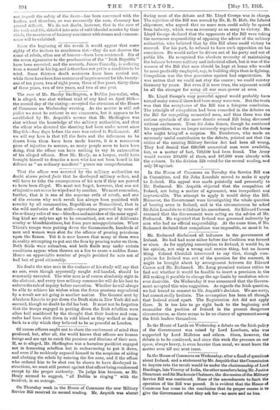On Thursday week in the House of Commons the new
Military Service Bill received its second reading. Mr, Asquith was absent during most of the debate and Mr. Lloyd George was in charge. The rejection of the Bill was moved.by Mr. R. D. Holt, the Liberal - shipowner, who argued that no more men could safely be spared from industry, which was an necessary as an army to victory. Mr. Lloyd George declared that the opponents of the Bill were taking the enormous responsibility of opposing the advice of the military authorities, who believed that by this Bill alone could victory be ensured. For his part, he refused to have such opposition on his conscience. He would rather be driven out of his party and out of public life. Ho recognized the absolute necessity of maintaining the balance between military and industrial effort, but it was of the essence of the Bill that men should be kept at home who would be more profitably employed, say, in building ships than in fighting. Compulsion was the true guarantee against bad organization. It was untrue that we could not stay the . course ; we could outstay Germany by years. But even if it were true, the argument would be all the stronger for using all our .man -power at once.


























 Previous page
Previous page